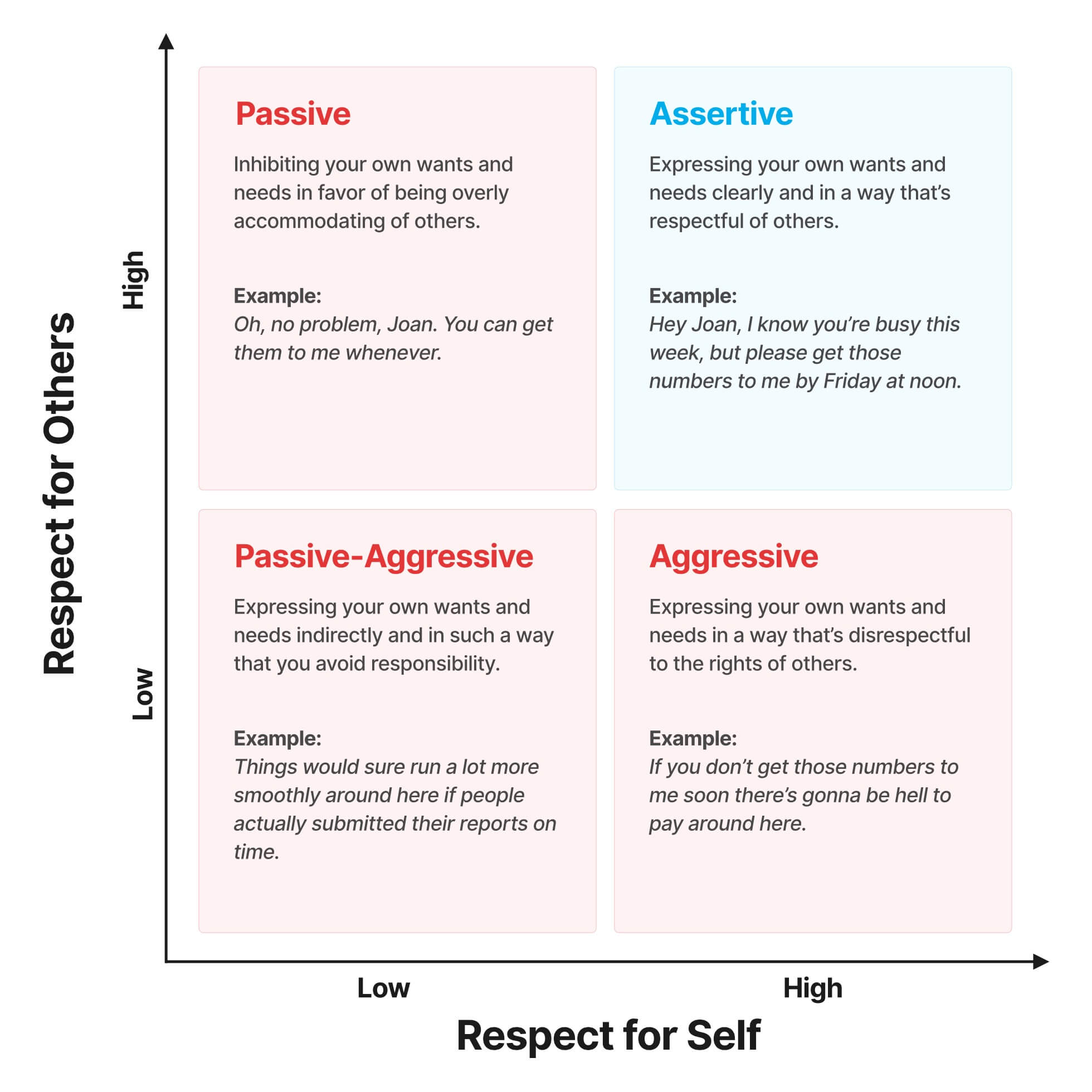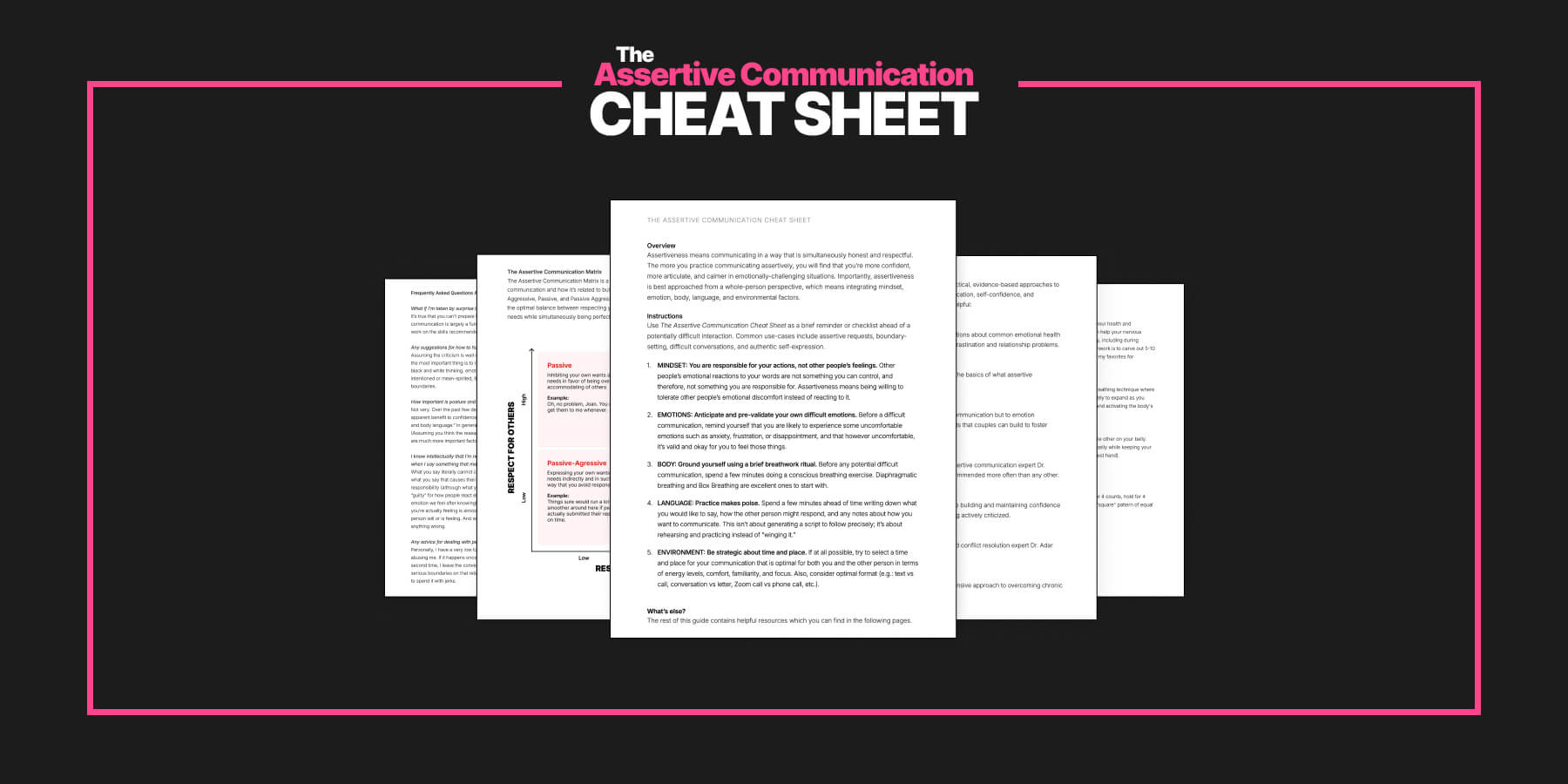Do you wish you were more assertive?
- Maybe you wish you felt more comfortable expressing your views and opinions in front of others?
- Or maybe you wish you could be more confident saying no and setting boundaries?
- It could be that you simply want to get better about asking for what you really want.
In this guide, you will not only learn how to be more assertive, but you’ll also discover a deeper understanding of what assertiveness is, how it works, and why it’s so in almost every aspect of your life from relationships and work to creativity and spirituality.
Feel free to jump to any section using the following links:
- Assertiveness and the 4 Communication Styles
- Why It’s So Hard to Be More Assertiveness
- The Benefits of Becoming More Assertive
- The True Meaning of Assertiveness
- How to Be More Assertive
- The Assertive Communication Cheat Sheet
Assertiveness and The 4 Communication Styles
As we’ll talk about later, assertiveness is more than just a way of communicating. But assertive communication is a good place to begin to understand the more general concept.
There are 4 styles or types of communication:
- Passive Communication
- Aggressive Communication
- Passive-Aggressive Communication
- Assertive Communication
Whenever you communicate with people—whether you know it or not—you’re using one of these styles.
Let’s briefly go through each and describe what it looks like and where it comes from.
1. Passive Communication
The passive style of communication is all about keeping your head down and avoiding conflict.
It often takes the form of “going with the flow,” avoiding conflict, giving in to other people’s requests and demands, and holding back from expressing your own desires and preferences:
- Pizza tonight? Well… Okay, sure, that sounds great! (Even though you really wanted Indian.)
- Drive back into town to pick up a six pack for you? Yeah, no problem, I like driving anyway. (Even though you’re exhausted and spent all day running errands.)
- Take on another new project and work on it all weekend? Yeah, of course, I can do it, boss! (Even though you promised your family you’d go hiking on Saturday.)
Notice that passive communication doesn’t mean not communicating at all or saying nothing. Instead, passive communication usually takes the form of going along with whatever someone else suggests despite not actually wanting to.
Also, while the passive style of communication may appear somewhat passive in terms of what you say, it’s often anything but passive in terms of what you do.
People with a passive style of communicating often look extremely busy and active because they’re constantly rushing around and working hard to take care of everyone else’s requests of them.
An overly passive style of communicating is one of the biggest causes of anxiety, chronic stress, and burnout.
2. Aggressive Communication
The aggressive style of communication is the inverse of the passive style: Rather than doing whatever is asked of you by others, you try to force others to do what you want, even if it’s at the expense of their own wishes.
Put another way:
In the passive style you give up an unreasonable amount of control over your own life, but in the aggressive style you try to take an unreasonable amount of control over other people’s lives.
A few examples:
- If I have to eat that goddamn lasagna one more time I’m going to lose it! You better find something else for dinner and quick.
- Obviously yelling is the only way to get anything done around here.
- Get out of my office and don’t come back ’till you’ve got something half-way intelligent to say.
A consistently aggressive style of communication is almost always a response to fear and insecurity.
Just like many playground bullies act the way they do in order to feel powerful and compensate for the bullying and fear they experience at home, most adults who use an aggressive communication style are acting out of a sense of fear and helplessness—although they’re often in denial about it.
While aggressive communication can feel empowering in the short term because it’s an ego boost, the long-term results are never satisfying and often make those feelings of insecurity worse. And over time, most people who overuse aggressive communication end up alienating the most important people in their lives and feeling increasingly alone and isolated, which only feeds their insecurity
3. Passive-Aggressive Communication
Passive-aggressive communication is a combination of the passive and aggressive styles.
It’s usually an attempt to get your way or express your frustrations and dissatisfactions while simultaneously avoiding responsibility for the consequences.
For example:
- Gossip, or talking badly about people behind their back, is a form of passive-aggressive communication where you vent or undermine someone while trying to avoid the consequences of doing it directly.
- Sarcasm is a common form of passive-aggressive communication that lets you criticize someone but avoid taking the blame because it was “just a joke.”
- Intentionally doing a task poorly so that you won’t be asked to do it again in the future is passive-aggressive since it allows you to get what you want and avoid the discomfort (or possible rejection) that comes from asking for it directly.
Passive-aggressive communication often works in the short term, but almost always leads to poor results in the long run. This is because the people around you eventually become so frustrated and upset with you that it can cause major relationship strife and loss.
And because people who regularly use the passive-aggressive style understand that they’re not being totally honest in the way they relate with people, chronic guilt and anxiety typically build up over time.
4. Assertive Communication
Assertive communication means communicating in a way that is fully honest about your own wants and needs and respectful of the other person.
For example:
- Pizza tonight? Actually, I’m kind of tired of pizza… How about Mexican food?
- This report still needs a lot of work. Why don’t you take a closer look at it with Tom from accounting and get back to me in a couple days?
- Hey boss, I’m having some trouble collaborating with Julie on the Johnson account. I think it might help if we had more clearly defined roles and objectives on the project.
To get a better sense for what exactly assertive communication is and is not, let’s briefly look at some common misconceptions about assertiveness:
- Assertive is not the same as aggressive. Aggression is when you violate the rights of others in pursuit of your own goals. Assertiveness, by definition, is always maximally respectful of the rights of others—even if you don’t always go along with their wishes.
- Assertiveness is not about other people, it’s about you. Fundamentally, assertiveness is about controlling your behavior, not other people’s. It’s not a way to control or manipulate other people to get what you want. Assertive communication is about taking responsibility for yourself and your behavior regardless of how other people behave.
- Assertiveness is not a personality trait, it’s a skill. Of course, our basic temperament and personality structure may influence our tendency to communicate assertively or not. But fundamentally assertiveness is a skill that anyone can cultivate with a little bit of practice and patience (I suggest some strategies for how to do this at the end of this essay).
To sum up:
Assertive communication means fully respecting yourself and other people in the way you communicate.
To get a better sense of what assertiveness is let’s try to visualize it…
The Assertiveness Matrix
One way to better understand the four communication styles is to visualize them in terms of two key dimensions: Respect for Self vs Respect for Others.
If you think of communication as being either high or low on each of those dimensions, you get the four styles of communication.
I call this The Assertiveness Matrix:

Assertive communication is usually the ideal way of communicating because it’s the best of both worlds: You’re high in respect for yourself and your own wants and needs but also highly respectful of the other person.
Of course, just because it’s ideal doesn’t mean it’s easy to do. Far from it. There are some very real obstacles to communicating more assertively as we’ll see.
Why Is It So Hard to Be More Assertive?
Of course, communicating assertively isn’t easy for most of us—at least not all the time and in every situation.
Most people have a hard time communicating assertively because—in one way or another—they’re afraid.
- We communicate passively and just go with the flow because we’re afraid of conflict and that people with think badly of us or judge us if we express what we really want. Or because we don’t want to deal with the drama and guilt that would go along with standing up for what we want.
- We communicate aggressively and put others down because it briefly makes us feel powerful and confident and alleviates our deeper fears and insecurities.
- We communicate passive-aggressively because we want the satisfaction of expressing our anger or hurt but we’re afraid to take full responsibility for expressing it.
In each case, we tend to avoid assertive communication because we’re afraid of how we or others might feel as a result—angry, guilty, anxious, disappointed, etc.
And while employing one of these three less optimal styles may help you avoid conflict or difficult feelings in the short-term, they almost always lead to negative results in the long-term:
- In the passive style, we feel chronically dissatisfied with ourselves, ashamed that we can’t stand up for what we want or believe, which leads to anxiety, chronic stress, and low self-esteem.
- In the aggressive style, we become socially isolated, lonely, and even depressed because people in our lives are afraid to interact with and open up to us.
- In the passive-aggressive style, people lose trust in and respect for us and often are chronically frustrated and irritated because of our flaky and responsibility-avoidant behavior.
On the other hand, there’s often temporary discomfort and blowback when we act or speak assertively:
- Speaking up for what we want and believe can produce temporary anxiety and nervousness.
- Sharing how we really feel leaves us vulnerable and may expose our insecurities and fears.
- Taking responsibility for our actions is difficult and requires a lot of work sometimes.
The initial discomfort of assertiveness can be even stronger when the people in our life aren’t used to us acting this way.
For example: after years of you just “going with the flow” whenever your spouse suggests a family vacation, they might be surprised when you all of a sudden say no and suggest an alternative
Others may say or imply that you’re selfish by not going along with their requests. Or your attempts at being more direct and respectful may be met with initial doubts or mistrust.
But ultimately, the habit of communicating assertively—of clearly and respectfully expressing your wishes and feelings—leads to the best outcomes in the long-run.
Speaking of which, here are some of the most important benefits that come from learning to be more assertive…
The Benefits of Learning to Communicate Assertively
The benefits of learning how to be more assertive are too many to list entirely.
But here are a few of the most common and compelling reasons to work on becoming more assertive in your communication:
- Decreased social anxiety and need for approval. As we become more skilled at expressing our own beliefs, wants, and needs in a direct and respectful way, we gain valuable evidence that we don’t need to worry as much about disapproval as we imagine. Learning to be more assertive is the best way to decrease your social anxiety and FODO: Fear of Disappointing Others.
- Become more relaxed and less stressed. One of the ironies of the three unhelpful communication styles is that they require a lot of work and energy. Once the initial emotional blowback of being more assertive fades, it’s a far more efficient and relaxing way to go about life. Becoming more assertive is one of the best ways to decrease chronic stress and burnout.
- Increase self-confidence and self-respect. If you chronically avoid expressing what’s genuinely important to you, you’re teaching your brain that your own wishes and values are not really that important. Do this enough, and you start to train your own brain to believe that you’re not that important generally. On the other hand, when you’re willing to honestly express how you feel and what you want, you’re reinforcing to your own brain that you are important and valuable. And ultimately, that’s the source of genuine self-confidence and self-respect.
- Become less resentful of others. When you rely on the three unhelpful styles of communication, you tend to project your own disappointment with yourself for not being honest and assertive onto other people in the form of chronic frustration and resentment.
- Better relationships. It’s a truism among couples counselors that all relationship problems are communication problems. And when it comes down to it, all communication problems are problems of assertiveness. When you learn how to communicate assertively—especially with spouse or partner—just about every aspect of your relationships improve, including getting less defensive.
The True Meaning of Assertiveness
While assertive communication is the most common form of assertiveness, it’s important to know that assertiveness is bigger than a style of communication and speech.
Assertiveness means living your life according to your values, not someone else’s.
It’s about respecting yourself enough to be genuinely okay with who we are and to live your life accordingly. And while this may take the form of speech and communication, it’s about how you act more generally.
- Keeping your word. When you lie or flake out on commitments you’ve made to other people, you not only decrease their trust and good faith in you, but you undermine your own trust in yourself. You create another piece of evidence that you’re not really reliable or consistent, which over time severely weakness your self-confidence and self-image. Sticking with our commitments is one of the most important forms of assertive behavior.
- Not second-guessing your decisions. When you make a reasonable decision but then spend hours, days, or weeks mentally ruminating and second-guessing that decision, you’re communicating to your own brain that your decisions can’t be trusted. On the other hand, when you abstain from worry and second-guessing, you demonstrate confidence and belief in yourself.
- Following through on goals. Assertiveness means being careful about the goals you set. Because every time you set a goal and then don’t follow through on it, you communicate to yourself that you’re not the type of person who follows through on what’s important to them. But when you are thoughtful and set reasonable goals that truly matter, and then work hard to achieve them and follow through, you reinforce the powerful idea that you’re a competent, reliable person—the core of healthy self-esteem.
- Defending our beliefs. If you really want to see good examples of passive, aggressive, and passive-aggressive communication at work, observe how people act and communicate when politics, religion, or other strongly held beliefs are on the line. Many people either avoid expressing and defending their beliefs because the imagined conflict “isn’t worth it,” or they become irrationally aggressive and/or indirect in defending their beliefs and end up being disrespectful or inflexible in the way they engage with people who differ.
- Asking for and giving feedback. Most people are terrified both at giving or receiving feedback because they lack self-confidence and are afraid of how they’ll feel (shame, embarrassment) or how others will feel about them (anger, disappointment). But to someone who’s assertive, feedback is a wonderful thing because it leads to growth and new insights.
At the end of the day, being more assertive means the willingness to go after what’s important to you even when it’s hard.
It means your decisions, speech, actions, and goals are all driven by your values rather than the passing whims and fears of the moment.
How to Be More Assertive
Assertiveness is a skill that needs to be built and developed over time. If you’ve read this far, hopefully you have a good understanding of what assertiveness is and why it’s important. But putting it into practice is an entirely different thing.
Here are a handful of simple ways to get started being more assertive in everyday life:
- Start small and narrow. Like any other skill in life, assertiveness needs to be built up slowly over time. So instead of trying to simply be more assertive everywhere and always, pick one small situation where you would like to be a bit more assertive. Work on that until you feel more confident, then slowly work on increasingly more challenging situations.
- Prepare ahead of time. It’s not always possible, but often you can prepare ahead of time to be more assertive in a specific situation. For example, before a difficult conversation, you might take 10 minutes to write down your thoughts and what you would like to say ideally. This will help you organize your thoughts, be less anxious leading up to the conversation, and also be more confident during the conversation. Also, be smart about when and where you decide to practice assertiveness. If you need to have a difficult conversation with your spouse, 10:00 am is probably better than 10:00 pm.
- Connect assertiveness with your values. Being assertive is hard. You are likely to encounter resistance—both from other people and yourself. In order to overcome that resistance, you can greatly improve your motivation and resolve by taking some time to clarify why being assertiveness really matters to you and how assertiveness will help you realize those values. For example: Setting better boundaries at work will help you live out your value of being present with your spouse and kids at home. So make sure to identify and clarify the values around your assertive behavior.
- Make imperfect decisions on purpose. When you’re faced with a trivial joint decision with someone—like which show to watch on Netflix with a friend or partner in the evenings—just pick the first thing that comes to mind and say that’s what you want to watch. Don’t worry if you’re not totally sure if that’s what you really want to watch or how the other person may or may not feel. Just say, I’d like to watch Detectorists. Or, Let’s watch Planet Earth. If you want to feel more confident you need to practice being more decisive, regardless of how you feel.
- Stop apologizing when you haven’t actually done anything wrong. Often times we say we’re sorry because we’re uncomfortable with the fact that someone else is uncomfortable, and so we say we’re sorry in an attempt to “make things better” and relieve the discomfort of the situation. Stop. Other people’s emotions are neither your responsibility nor something you can control.
- Understand how to set good boundaries. If someone asks a favor that’s either unreasonable or that you simply don’t want to go along with, simply say no. Understand that you’re going to feel uncomfortable afterward and that the whole point is to build up your tolerance for that discomfort. Of course, start practicing this in small, lower-stakes situations until you feel more confident then gradually work your way up. You can read more about this here: 5 Rules for Setting Healthy Boundaries
- Stop trying to manage how other people feel. Instead of offering solutions to or doing things to try and make people feel better, try simply acknowledging that they’re having a hard time and leaving it at that. Be a good listener, validate their emotions, but don’t take responsibility for them.
Remember: As you practice being more assertive—even in small ways—it’s going to feel uncomfortable for you as well as the people around you who are used to you being less assertive.
It’s important that you expect this so that at least you’re not caught off guard by it in the moment.
The Assertive Communication Cheat Sheet

If you’d like a brief summary of the key ideas around assertive communication and how to be more assertive, I’ve created an Assertive Communication Cheat Sheet—a free 5-page PDF guide that summarizes my favorite tips for communicating assertively, plus answers to common questions, and extra resources and tools.
Get a copy of the cheat sheet here →
Next Steps
If you enjoyed this guide, here are a few more resources from me that might be helpful:




